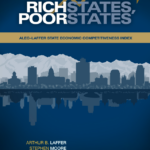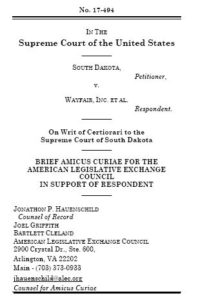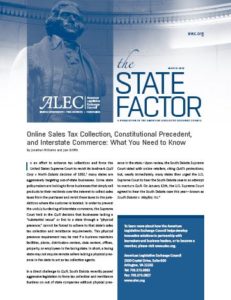Business
Key Points
- States should not further restrict the options and rights of businesses and workers to negotiate their own wages by raising the price floor on the cost of labor.
- When occupational licensing or regulations, state legislatures should be required to show real harm and select the least-restrictive regulation to address that harm rather than impose further complicated red tape on those wanting to start a new business or career.
- Individuals should be free to decide for themselves whether or not they would like to join or contribute to a labor union without that being a precondition of employment.
Maintaining a healthy economy and fostering economic growth is one of the most important priorities for hardworking Americans. The cost of everyday life is increasing and people need to make sure that their job opportunities and paychecks keep up. Policymakers must create a plan of action that focuses on policies that increase economic opportunity, promote freedom of association and lower barriers to entry for new businesses.
Prioritizing the preferences of individuals by making union membership and contributions voluntary is an important reform that affects all businesses. Policies on organized labor should emphasize transparency and protect an individual’s choice regarding union involvement. No person should be forced to be a member of a union as a condition of employment or devote part of their paycheck towards political causes with which they disagree.
State occupational licensing boards should ensure licensure requirements for employment serve a valid public health and safety need, and that they provide individuals the most opportunity to succeed and contribute to the economy. Occupational licensing increases unemployment by about one percent, raises prices by about 15 percent, and offers no incremental consumer protection over a competitive market. Eliminating or reducing unnecessary occupational licenses gives individuals the freedom to pursue their desired career goals, free from arbitrary barriers to entry that favor incumbent firms in a particular industry.
Finally, policies on wages ensure individuals are free to make their own decisions and ensure that workers are not priced out of the labor force via government fiat. Setting price controls generally damages the economy by restricting decisions both businesses and individuals are able to make, and setting a price floor on wages is no exception. Maximizing the freedom of businesses and employees to negotiate their own wages is an important factor in helping both parties come to an agreement and thrive.
Model Policies
-
Right to Start Act Final
BE IT ENACTED BY THE __________ (GENERAL ASSEMBLY OR LEGISLATURE) OF THE STATE OF __________: This bill shall be known and may be cited as the “Right-to-Start Act.” Section A: Office of Entrepreneurship There is hereby created within the _________ (Department) of __________ (Economic Development or Commerce or Other)…
-
The Smart Cryptocurrency Rules Act Final
1. Definitions: For the purposes of this chapter, the words defined in this section have the meaning given. a. “Digital assets” refers to cryptocurrencies, as well as natively electronic assets, which may include stablecoins, non-fungible tokens (NFTs), and other digital-only assets that confer economic, proprietary, or access rights…
-
Protecting Businesses and Workers Act Final
SECTION 1. This Act shall be known and may be cited as the “Protecting Businesses and Workers Act.” SECTION 2. Chapter _______ of Title _______ of the Official Code of _______ (State Name) Annotated, relating to minimum wage law, is amended by revising Code Section _______, relating to…
-
Establishing a Public-Private Partnership (P3) Office Act Final
Model Policy {Title, enacting clause, etc.} Section 1. {Title} This Act may be cited as the “Establishing a Public-Private Partnership (P3) Office Act.” Section 2. {Definitions} The following definitions apply in this section: (A) “Contract” means any purchase and sale agreement, lease, service agreement, franchise agreement, concession agreement,…
-
Resolution Urging Congress to Protect Consumer Privacy in Banking and Financial Transactions Final
Resolution Urging Congress to Protect Consumer Privacy in Banking and Financial Transactions WHEREAS, the Biden Administration and some in Congress have proposed changes to tax information reporting which would require financial institutions to provide the Internal Revenue Service reports of incoming and outgoing transactions from every customer financial…
-
Targeted Regulatory Sandbox Act Final
Purpose: This proposal modifies provisions related to the (insert relevant state agency) and allows businesses, under the observation of regulators, to trial new products, services, and business models while bypassing regulations unsuited for their innovative idea. Section 1. Highlighted Provisions. This bill: defines terms; creates an ____________ regulatory sandbox program…
Press Releases
-

New 50-State Rankings Showcase Economic Policies Attracting Individuals and Job Creators
ARLINGTON, Va. – Today, the American Legislative Exchange Council (ALEC) released the 16th edition of Rich States, Poor States: ALEC-Laffer State Economic Competitiveness Index, the annual report assessing each…
-
ALEC Scholar Dr. Arthur Laffer Receives Presidential Medal of Freedom
FOR IMMEDIATE RELEASE Contact: Daniel Reynolds dreynolds@alec.org ALEC Scholar Dr. Arthur Laffer Receives Presidential Medal of Freedom Sound economics recognized by the President…
-
Rich States Attract More Residents, Poor States Make Them Leave
Contact: Dan Reynolds dreynolds@alec.org Rich States Attract Residents, Poor States Make Them Leave ARLINGTON, VA – (April 15, 2019) The American Legislative Exchange Council (ALEC) releases today, Rich States,…






